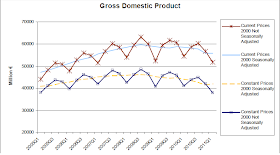Here's a little snippet while I wait for Blogger to get its act together and restore my posts. Readers will note that a pretty devastating failure across Blogger has meant that some of my posts have reverted to past editions of themselves and you will not have been able to post comments for a while.
I'm not sure what the deal is but you can follow the repair work (which Blogger claims is almost complete) here.
Anyway today's FAIL comes from ELSTAT which has published its provisional GDP growth estimates for Q1 2011.
Brace yourselves for this friends: apparently the Greek economy grew by 0.8% quarter on quarter. Conservative Brits have gone mental as we're now supposedly growing faster than them.
Now although this comparison is a bit stupid, it does raise the question of just how fast Greece is growing. You see, the 0.8% figure is seasonally adjusted real growth. Seasonally adjusted nominal growth is 0.1%. Unadjusted nominal growth is -8.6% and unadjusted real growth is -9.6%. These figures may sound horrible but do bear in mind the Greek economy is highly seasonal, growing in boob-shaped fits and starts, and the adjustments are usually done for a reason.
What does strike me as odd is the cheerful reaction of the FinMin, who basically said that this demonstrates that the revenue shortfall of Q4 2010 was a blip and has not derailed our adjustment plans. R-ight. Apart from the fact that the nominal output of the Greek economy is currently lower now than this time of the year six years ago. And we're still paying our debt in nominal Euros.
In this case though I'm beginning to have my doubts and I need help from any reader who knows how the seasonal adjustment is actually performed by ELSTAT. I know how simple models work but this one is different. To me it looks like there has been a big allowance for seasonal effects in deflating the Q1 2011 GDP figures. I'm not sure why adjusted and unadjusted year on year growth should differ so much, surely yoy captures the seasonal effect in both cases? But I am straying outside my usual prowling grounds here.
Here are the figures, see what you can do:
I'm not sure what the deal is but you can follow the repair work (which Blogger claims is almost complete) here.
Anyway today's FAIL comes from ELSTAT which has published its provisional GDP growth estimates for Q1 2011.
Brace yourselves for this friends: apparently the Greek economy grew by 0.8% quarter on quarter. Conservative Brits have gone mental as we're now supposedly growing faster than them.
Now although this comparison is a bit stupid, it does raise the question of just how fast Greece is growing. You see, the 0.8% figure is seasonally adjusted real growth. Seasonally adjusted nominal growth is 0.1%. Unadjusted nominal growth is -8.6% and unadjusted real growth is -9.6%. These figures may sound horrible but do bear in mind the Greek economy is highly seasonal, growing in boob-shaped fits and starts, and the adjustments are usually done for a reason.
What does strike me as odd is the cheerful reaction of the FinMin, who basically said that this demonstrates that the revenue shortfall of Q4 2010 was a blip and has not derailed our adjustment plans. R-ight. Apart from the fact that the nominal output of the Greek economy is currently lower now than this time of the year six years ago. And we're still paying our debt in nominal Euros.
In this case though I'm beginning to have my doubts and I need help from any reader who knows how the seasonal adjustment is actually performed by ELSTAT. I know how simple models work but this one is different. To me it looks like there has been a big allowance for seasonal effects in deflating the Q1 2011 GDP figures. I'm not sure why adjusted and unadjusted year on year growth should differ so much, surely yoy captures the seasonal effect in both cases? But I am straying outside my usual prowling grounds here.
Here are the figures, see what you can do:
UPDATE: Fellow statpornographer Greg Farmakis has been in touch to point out that this may be explained by ELSTAT's massive seasonally adjusted GDP series break - the reason why they no longer publish anything but flash figures on this series. Hence also the shocking -6.6% figure for 2010.
Seems to me that if the adjustment isn't good enough for the proper figures, it's not good enough for flash and should not be reported on triumphantly.


No comments:
Post a Comment
Please remember that I am not notified of any comments and will not respond via comments.
Try to keep your criticism constructive and if you don't like something, do tell me how to fix it. If I use any of your suggestions, you will be duly credited.
Although I'm happy to entertain criticism of myself in the comments section, I will not tolerate hate speech. You will be given a written warning and after that I will delete further offending comments.
I will also delete any comments that are clearly randomly generated by third parties for their own promotion.
Occasionally, your comments may land in the spam box, which may cause them to appear with a slight delay as I have to approve them myself.
Thanks in advance for your kind words... and your trolling, if you are so inclined.